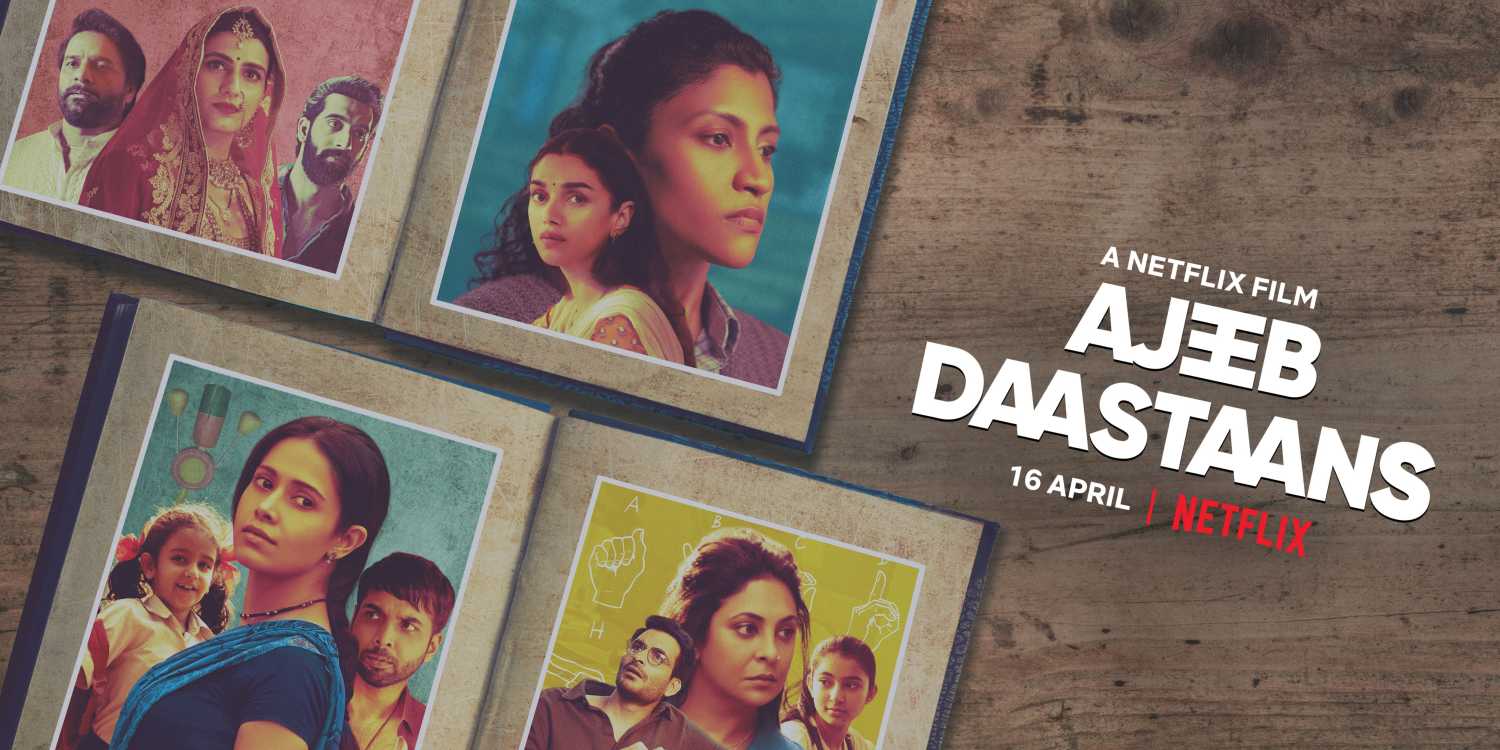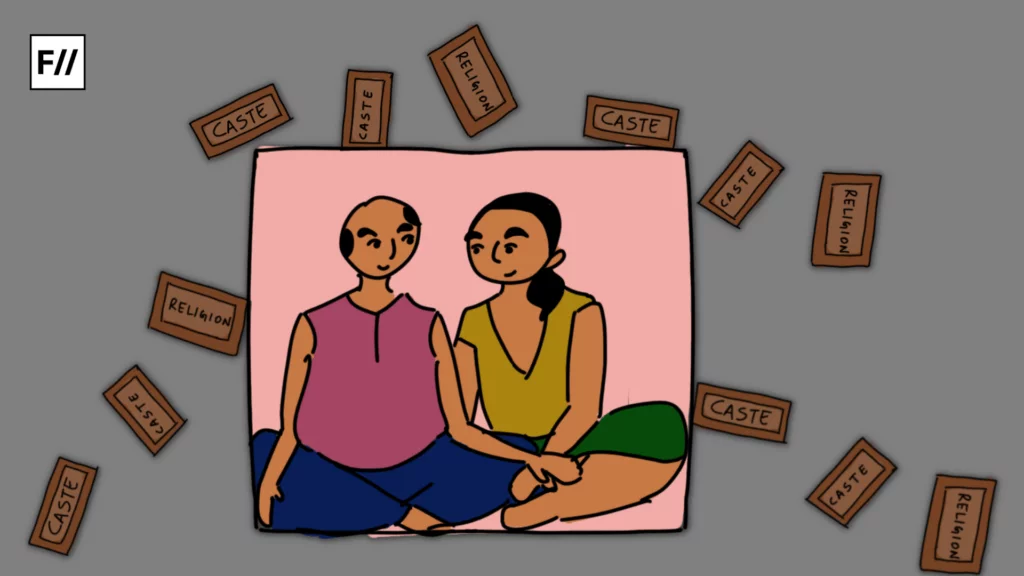Ajeeb Daastaans, an anthology released on Netflix by the Yash Raj Studios depicts the glaring realities of households across all classes in the Indian society. Revolving around fractured relationships, it is a collection of four stories that keep intersectionality as their central theme. What one observes in them is a cyclical process – the impact of social differences on individual psychology and the result of individual actions on societal processes.
The rest of the article contains spoilers for plot.
Shashank Khaitan’s “Majnu” set in the background of exploitative class relations highlights how dysfunctionality of marriage can be a consequence of an individual’s inability to express as a result of being trapped under societal pressures. Here, Babloo (Jaideep Ahlawat), a rich and shady businessman is married to Lipakshi (Fatima Sana Shaikh), an MLA’s daughter as part of a deal. While Babloo’s inability to love Lipakshi is revealed in a plot twist where he confesses to be gay, Lipakshi’s search for love and happiness is lost when Raj (Armaan Rahlan), the driver’s son, avenging his father’s exploitation over the years, steals Babloo’s money, tricks her and flees abroad with his parents.

As the director tries to bring in focus the need for addressing and accepting homosexuality and the exploitation of the working by the upper class, one also is able to look at the impact of societal norms on the family. Lipakshi’s compromised sexual needs and Babloo’s inability to fulfill them stem from the lack of acceptance and deeper understanding of their individual process by their respective families. Further, one cannot help but question the morality that looms on all traditions in the Indian society. Has it shuffled up priorities, put greed before need, material before emotions?
The four stories cut across all classes in the structure of the society. Human emotions like love, happiness, jealousy, anger and fear are all products of a war that each individual fights within this structure. A war that makes them want to question the status quo on one hand, and forces them to comply with the oppressive rules on the other
The second story, “Khilauna” directed by Raj Mehta is a psychological horror drama showing the intensity of the consequences that result from the nation’s glaring class divide, and wrenching poverty. The story revolves around two orphan sisters, Binny (Innayat Verma) and Meenal (Nushrat Bharuchha) whose mother passes away after Binny’s birth and father abandons them. They live in a secluded section of an upper class gated society where Meenal works as a domestic help.
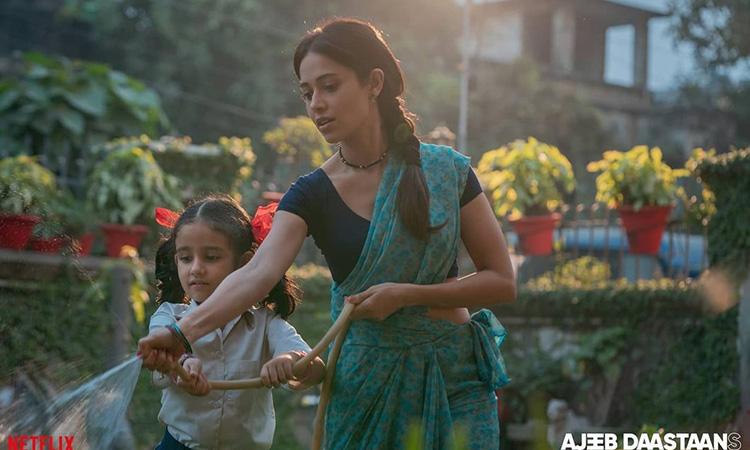
Sushil (Abhishek Banerjee) who has an affair with Meenal does ironing and laundry for the residents of the community. Meenal, who earlier worked at Abha’s (Meenal Kapoor) place shifts to Vinod Agarwal’s (Maneesh Verma) residence for he’s the society secretary and the only one who could bring back electricity to her residence within a slum. While Meenal is uncomfortable with Vinod Agarwal’s attraction towards her, the latter attempts to sexually harass her.
There are also instances where Vinod Agarwal is shown beating Sushil for alleged misconduct. Observing all this is Binny, a little school girl who is exposed to the harsh realities of poverty and often left feeling unattended to, especially after the birth of Vinod Agarwal’s son. Her innocence is darkened by fuming jealousy and anger as a result of being observant of the mistreatment of their class. The killing of the new born by Binny is strongly suggestive of the intensified, suppressed emotions and fear that one experiences as a result of the never ending struggles of those who are pushed to the bottom of the societal ladder.
The rigidity of norms that has created a homogeneous, classist, casteist idea of morality is the major cause for the dysfunctional families that constitute today’s society. While social norms and traditions have been reputed for maintaining order and stability in the society, the stories in Ajeeb Daastaans argue against it
Neeraj Ghaywan’s “Geeli Puchi” starring Konkana Sen as Bharati Mandal and Aditi Rao Hydari as Priya Sharma shows the compromised experiences of caste inequalities. The story presents the viewers with a lens of intersectionality through caste and homosexuality. Further highlighting the stereotypes associated with how a woman should look and act, Geeli Puchi also showcases how societal pressures and unequal opportunities created by the hierarchised structure makes an individual drift apart from oneself, allowing the society to win over individual needs by taking advantage of ironical values like adjustment.
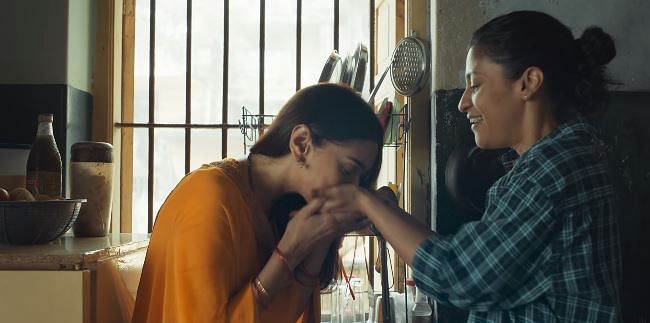
The story, set in a factory in Bengal, owned by a Brahmin showcases Bharati Mandal, an educated Dalit woman working amidst male workers who, because of her deviation from their stereotypical idea of women, refuse to accept her as one among them. Being educated enough, she seeks the job of an accountant but is denied the offer because of her social status.
Also read: Geeli Pucchi: Exploring The Messiness Of Caste And Sexuality
Priya Sharma, on the other hand, though less capable than Bharati, is given the job. Soon, Bharati and Priya develop a bond. While Bharati confidently embraces her homosexual identity, Priya, unable to be happy in her marriage and confused about her feelings for women, sees it as an illness. However, things change when Bharati tells Priya about her Dalit status. One sees an immediate reluctance on Priya’s part to acknowledge Bharati as a close friend. Bharati, feeling exploited, manipulates Priya into having a kid, meanwhile taking over her position as the accountant.

The lack of space to understand oneself and the conflicted individualities forced into acceptance by the society’s rules leave no room for individual discovery. The conflicts in Bharati’s marriage that led to her divorce and the inability of Priya to be happy even after having a child shows how unaddressed confusions produce collective dysfunctionalities, further affecting an individual’s mental peace.
What one sees in these mirrored visuals is suppressed conflicts within an individual as the reason for dysfunctionality within a collective. When difficult to contain, it spills on to other individuals, causing an increase in dysfunctionalities, hampering individual mental health and strengthening the society’s ego
The last story directed by Kayoze Irani, “Ankahi”, is a story entails Mumbai’s upper class family atmosphere, depicting dysfunctionality in a long term marriage due to the lack of understanding and conflicting opinions, between Natasha (Shefali Shah) and Rohan (Tota Roy Chowdhary) alongside their teenage daughter Samaira (Sara Arjun) who is hard of hearing. Feeling disappointed, unloved and neglected, Natasha seeks comfort elsewhere. She meets a photographer named Kabir (Manav Kaul) who faces the same hearing challenge as her daughter.
![Ankahi [Ajeeb Daastaans (2021)] : दिल ठहरा जहाज का पंछी – Cine Manthan](https://images.thequint.com/thequint%2F2021-04%2Faa2245ac-c561-40ca-81d1-9d05c8d572d9%2Fi_just_didnt_find_the_need_to_talk_shefali_on_learning_sign_language_for_ajeeb_daastaans_001.jpeg?rect=0%2C0%2C1120%2C588&w=1200&auto=format%2Ccompress&ogImage=true)
As Natasha seeks home outside, guilt seeps into her when she finds her husband attempting to change things and fix their dysfunctionalities. Kabir, unaware of Natasha’s marriage, discovers it and is left shook. Natasha’s conflicted individuality is persistent with most marriages today in the long run. The loss of love, intimacy and understanding over the years leads her to do something that the societal norms labels “immoral” for a mother and a wife. The socially acclaimed homemaker, she cannot be the reason her home falls apart even though her individual needs get sacrificed.
Her problematic marriage, creates a role conflict, between her as an individual and her in relationship to her family. As the societal norms cheer on their win over an individual’s needs and happiness becomes a relative term, one family’s dysfunctionality creates a conflicted individual elsewhere. Kabir, the outsider here, becomes the victim of Natasha’s conflicted individuality.
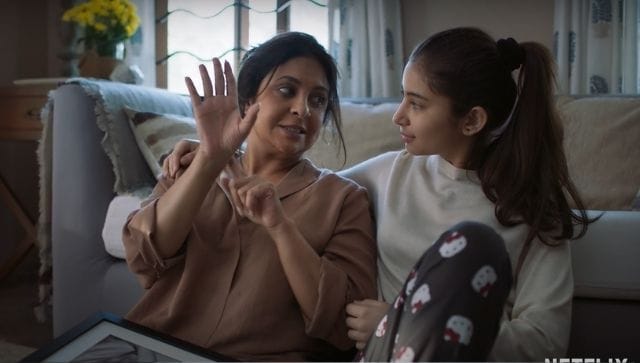
The four stories cut across all classes in the structure of the society. Human emotions like love, happiness, jealousy, anger and fear are all products of a war that each individual fights within this structure. A war that makes them want to question the status quo on one hand, and forces them to comply with the oppressive rules on the other.
The rigidity of norms that has created a homogeneous, classist, casteist idea of morality is the major cause for the dysfunctional families that constitute today’s society. While social norms and traditions have been reputed for maintaining order and stability in the society, the stories in Ajeeb Daastaans argue against it.
What one sees in these mirrored visuals is suppressed conflicts within an individual as the reason for dysfunctionality within a collective. When difficult to contain, it spills on to other individuals, causing an increase in dysfunctionalities, hampering individual mental health and strengthening the society’s ego.
Also read: “Middle class morality dictates the conversations around sexuality in India”: Vidya Reddy
Netflix’s Ajeeb Dastaans, therefore, manages to draw an analogy between the chicken and egg dilemma with dysfunctional relationships and conflicted individualities.
Akanksha is a second year Sociology student at Jesus and Mary College, University of Delhi. Her areas of interest include international relations, social issues and mental wellness. She’s a film enthusiast and she loves adding her perspective to them. She also occasionally writes poetry and her favourite mode of expression along with writing, is art.
Featured image source: Cinestaan
